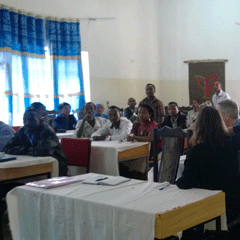[24 March 2014] -- Faced with fast-growing cities, inadequate urban infrastructure, and a large youthful population in need of employment, the Ethiopian Government turned to an innovative solution: Cobblestone road production throughout the country, driven by community participation and local materials.
In recent years, cobblestone road creation has become one of the most successful infrastructure and job creation programmes in the country, with tremendous benefits for the urban poor. It has created hundreds of thousands of jobs, greatly improved urban mobility, and built collaborative relationships between communities and local authorities.
The investments in cobblestone roads have also attracted international attention. In 2013, UN-Habitat awarded the Ethiopian Ministry of Urban Development, Housing and Construction (MUDHCo) with a prestigious Scroll of Honour Award for the initiative.
The initiative was supported jointly by the German Development Cooperation and the Bill & Melinda Gates Foundation, which is funding cobblestone road production in eight secondary cities throughout the country. The project is being implemented by MUDHCo in partnership with the German Organisation for International Cooperation (GIZ) and the German Development Bank KfW.
Transforming local economies with cobblestones
Cobblestone paving makes perfect sense for Ethiopia’s burgeoning urban roads. It is labour-intensive, creating jobs as well as opportunities for construction entrepreneurs. It uses natural and local materials that are plentiful. It is also cost-effective compared to concrete and asphalt roads, easy to maintain and has a much longer lifespan. Moreover, it is easy to replicate elsewhere, because the investment needed is relatively small and production skills are easy to learn.
Initiated and coordinated by the federal government as part of its Leveraging Urban Spending to Maximise Benefits of the Urban Poor (LUSUP) initiative, the cobblestone project is implemented by local communities themselves. Community representatives accompany city administrations to practice the job tender procedures, and they are assisted in monitoring the construction quality.
Training centres ensure that the competing micro and small enterprises acquire the skills needed for chiseling, paving, and project management – key capacities if the cobblestone project is to turn temporary job creation into permanent employment. Citizens monitor and oversee the cobblestone road construction, fostering strong community ownership.
These changes are transforming Ethiopia’s city marketplaces into better connected, economically vibrant places. People are able to move around cities more easily, both in vehicles and on foot. Public transportation and solid waste management collectors are able to reach previously unreachable neighbourhoods. Flooding has diminished during the rainy season, and residents have a much healthier environment than with the old dirt roads. Small enterprises are opening for business, and investment in private homes is rising.
Empowering women and youth through jobs
The urban poor have benefited tremendously from the initiative, especially youth and women. Of the 489,000 new jobs created, between 40-45 percent of the jobs have been filled by women. Many participants are previously unemployed youths, who have now obtained new skills and livelihood strategies as part of the project. This employment has helped given them a sense of empowerment and community pride.
“The women in the communities we spoke to were often the most vocal in their appreciation for the project, which provided them with additional income, skills, and helped free up time from the ‘double burden’ of unpaid care work in the home,” said Nicola Demme, Programme Manager of the GIZ LUSUP Project. Demme visited several work sites this past February with a Cities Alliance team who is providing technical advisory services and grant portfolio management oversight to the Bill & Melinda Gates Foundation grants in the country.
Peter Maats of the German Development Bank KfW was also struck by women’s enthusiasm for the project. “One woman in Yirgalem city expressed delight that she didn’t have to rely on her husband as much for livelihood and income now that she had participated in the project, and that her daughters also wanted to be trained in similar skills,” he noted.
Lessons learned
The cobblestone project has valuable lessons for other countries interested in pursuing a similar approach. They are:
-- Investing in community mobilisation and ownership is critical for strong monitoring and quality control. Community groups in many of the communities, including Yirgalem city, valued the benefits to the local economy brought by the new road so much that they voluntarily carried out quality assessments and partnered up with the city administration to monitor the construction progress. When substandard stones were identified in the road, these community committees ensured that the stones were replaced.
-- Sustaining community participation requires capital investment in cities. It is extremely difficult to sustain community mobilisation efforts or municipal government interest in participatory planning if the processes are not followed by capital investments. Focusing on the linkage between planning, community mobilisation and practical project implementation helps to ensure sustainable community involvement and government receptiveness.
-- Strengthening the capacity of national staff supports project sustainability. By balancing resources to build national staff capacity, the project has been able to move beyond the grant lifecycle and is on its way to becoming institutionalised.
The Cities Alliance has a growing portfolio in Ethiopia, which has been a member since 2006. The partnership has supported the establishment and operation of the Ethiopian Cities Network, the development of an integrated urban database, and a State of the Cities Report, among others.
Ethiopia has also been a key player in the process of formulating a Cities Alliance Africa Strategy, hosting the initial meeting to in Addis in March 2013. The relationship is expected to strengthen even further in coming years, as Ethiopia has expressed interest in becoming the next Cities Alliance Country Programme.
Making Residents’ Lives Better
Mesele Mena runs the Ply Hotel on a formerly earthen road in Awassa. The new cobblestone road, which now connects to Awassa’s central square, was a pleasant surprise for him and he is glad that the old muddy road is finally gone. The Ply Hotel contributed 1,500 Birr to the cobblestone road initiative and Mesele is happy about it. “It would be worth contributing even more. It is the first visible initiative in this area so far.” With the cobblestone road, his customers and income have both increased.
The owner of the Kelay Hotel in Awassa, Mr. Kelay, was so pleased with the cobblestone initiative that he collected the mandatory fees from other shopkeepers and provided drinks for the construction workers. He says that he has 30 percent more guests than before thanks to the new road. “The main problem during the rainy season was the dirt and the mud in the streets outside the bar,” he said. “During the dry season it was the dust that caused problems and kept customers away.”
Before a cobblestone road was built in 2010, the local residents of the Selle neighbourhood in Adama had to rent horse-drawn carts (garis) and three-wheeled taxis (bajajs) to travel to the city centre and back at a cost of two to three Euros per trip – a major financial burden for most families. With a new cobblestone road, a minibus line now provides transportation for the 7,200 local residents at a much lower cost, only 9 cents per trip.

Cobblestone road construction is labour intensive and production skills are easy to learn. Photo: William Cobbett/Cities Alliance
Over the past five years, the cobblestone project has created 489,000 jobs and more than 2,202 km of road in over 140 cities.

Communities actively monitor the progress of cobblestone projects at local meetings such as this one in Yirgalem . Photo: GIZ
Related Items




